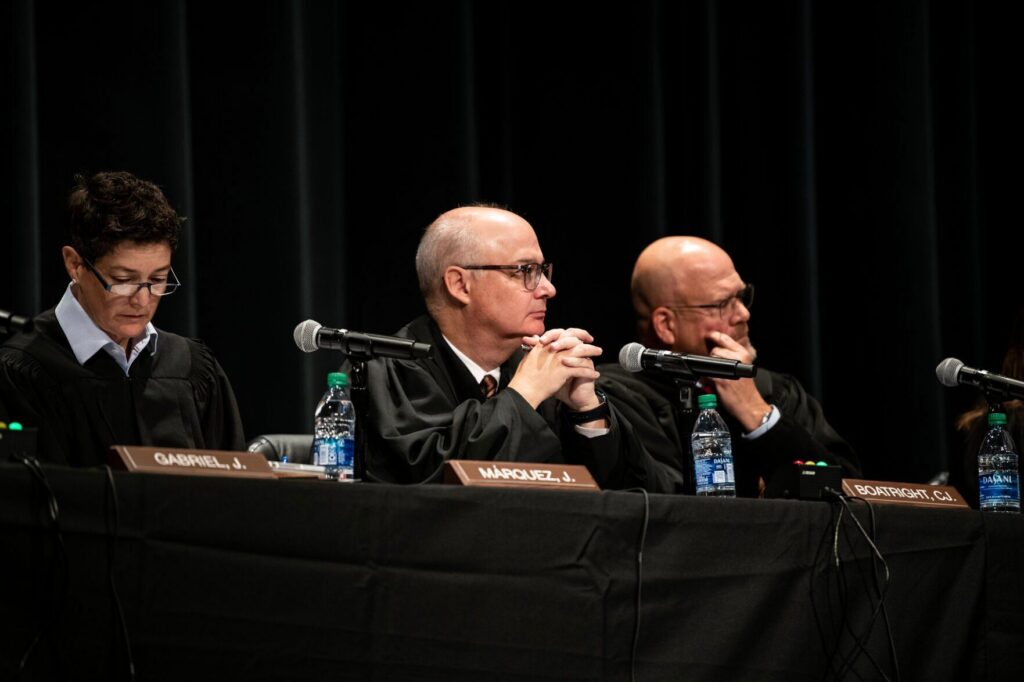Federal judge dismisses National Guard member’s First Amendment lawsuit
A federal judge on Friday dismissed a lawsuit from a member of the Colorado National Guard who alleged leadership unconstitutionally punished him for derogatory remarks made on a podcast.
In a March 14 order, U.S. District Court Chief Judge Philip A. Brimmer expressed some confusion about how plaintiff David Morrill was alleging his First Amendment rights had been violated. Nonetheless, Brimmer did not need to reach that issue because he noted Morrill’s lawsuit seeking up to $10 million was against officers of the National Guard in their “official capacities” — meaning the lawsuit was effectively against the state itself and was subject to constitutional immunity.
Moreover, Brimmer did not believe he could direct the state to do anything because there appeared to be no ongoing violation of Morrill’s rights.
“Therefore, even where plaintiff asserts that his speech has been chilled, he must identify an ongoing, retaliatory act that is chilling his speech,” Brimmer wrote. “Plaintiff fails to do so in relying on past acts of alleged retaliation to support his claims.”
Morrill is a sergeant first class in the Colorado Army National Guard who serves part time. On March 11, 2022, he appeared on a podcast while off-duty and not in military clothes, although he identified his rank at the outset. During the conversation, Morrill:
• Called then-Vice President Kamala Harris “so, so stupid” and that she was “trying to be dumber than Joe Biden”
• Wondered if Harris was “trying to see how much the country will tolerate because of her skin color”
• Voiced agreement with the host’s statement that George Floyd, a Black man who a Minneapolis police officer killed in May 2020, “victimized himself”
After the National Guard received a complaint about the podcast, Morrill added a required disclaimer noting his views did not necessarily reflect those of the military.
An investigating officer concluded Morrill’s comments about Floyd and about a “man of mixed ethnicity” were in violation of a Colorado law addressing disreputable conduct and were “not in line with the Army values.” She also found Morrill’s comments toward Biden and Harris were “contemptuous” and “derogatory,” also in violation of Colorado law applicable to service members.
“It is recommended that the unit Commander administer a non-judicial punishment to reduce (Morrill) in rank and/or require (Morrill) submit his request to retire,” wrote Major Virginia Usher.
Morrill then submitted a memo arguing he was being punished for exercising his First Amendment rights while off duty. He disputed Usher’s conclusions.
“While one might erroneously assume the statement is expressing a view concerning President Joe Biden, the statement reaches no objective conclusion about the President – positive or negative,” he wrote. “No statement is made about the President’s relative intelligence, and the statement is valid irrespective of President Biden’s intellectual capabilities.”
Col. Alyssa Aarhaus responded to say she was reprimanding Morrill. His remarks about race were “deeply violative” of the Army’s equal opportunity policy and his comments toward the president and vice president “display a deep contempt and disrespect for the two highest ranking members of our chain of command.”
Aarhaus demoted Morrill, but suspended the punishment for six months with the condition that Morrill commit no further infractions.
Morrill, representing himself, sued various members of the National Guard for their “overbroad, constitutionally-violative, and extrajudicial application of the Colorado Military Code.” He sought up to $10 million and a declaration that the National Guard violated his rights.
In November, U.S. Magistrate Judge Kathryn A. Starnella recommended dismissing the lawsuit. She observed the federal appeals court with jurisdiction over Colorado had decided 40 years ago the National Guard is an “arm of the state” entitled to immunity under the 11th Amendment. Starnella also noted there appeared to be no ongoing injury for which the court could order an injunction.
“Plaintiff does not allege that that suspended punishment ever went into effect or that he ever lost rank, even temporarily,” she wrote.
Morrill objected to Starnella’s conclusions and contended he would be able to amend his lawsuit to address the deficiencies. Brimmer, the district judge, agreed the National Guard defendants could not be sued in their official capacities due to immunity. He also could not identify a specific ongoing injury Morrill wanted him to remedy.
Brimmer gave Morrill until April 14 to amend his allegations. Morrill told Colorado Politics he intended to do so.
“I contend that service members do not lose their constitutional rights while serving and, particularly, the exercise of these rights while not on duty, not in uniform, and clearly not representing the military in any capacity,” he said. “Additionally, my case represents an all-too-common instance of viewpoint discrimination within the ranks — that is, my military employers took action against me not because I spoke, but because what I said didn’t match the culturally required positions of the woke military of 2022.”
The Colorado National Guard did not immediately respond to a request for comment.
The case is Morrill v. Aarhaus et al.













